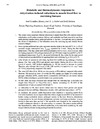Identificador persistente para citar o vincular este elemento:
https://accedacris.ulpgc.es/jspui/handle/10553/6548
| Título: | Metabolic and thermodynamic responses to dehydration-induced reductions in muscle blood flow in exercising humans | Autores/as: | González-Alonso, J. Calbet, José A.L. Nielsen, Bodil |
Clasificación UNESCO: | 241106 Fisiología del ejercicio | Palabras clave: | Cardiac output Heat Exercise |
Fecha de publicación: | 1999 | Publicación seriada: | Journal of Physiology | Resumen: | 1. The present study examined whether reductions in muscle blood flow with exercise-induced dehydration would reduce substrate delivery and metabolite and heat removal to and from active skeletal muscles during prolonged exercise in the heat. A second aim was to examine the effects of dehydration on fuel utilisation across the exercising leg and identify factors related to fatigue. 2. Seven cyclists performed two cycle ergometer exercise trials in the heat (35 C; 61 +/- 2 % of maximal oxygen consumption rate, VO2,max), separated by 1 week. During the first trial (dehydration, DE), they cycled until volitional exhaustion (135 +/- 4 min, mean +/- s.e.m.), while developing progressive DE and hyperthermia (3.9 +/- 0.3 % body weight loss and 39.7 +/- 0.2 C oesophageal temperature, Toes). On the second trial (control), they cycled for the same period of time maintaining euhydration by ingesting fluids and stabilising Toes at 38.2 +/- 0.1 degrees C. 3. After 20 min of exercise in both trials, leg blood flow (LBF) and leg exchange of lactate, glucose, free fatty acids (FFA) and glycerol were similar. During the 20 to 135 +/- 4 min period of exercise, LBF declined significantly in DE but tended to increase in control. Therefore, after 120 and 135 +/- 4 min of DE, LBF was 0.6 +/- 0.2 and 1.0 +/- 0.3 l min-1 lower (P < 0.05), respectively, compared with control. 4. The lower LBF after 2 h in DE did not alter glucose or FFA delivery compared with control. However, DE resulted in lower (P < 0.05) net FFA uptake and higher (P < 0.05) muscle glycogen utilisation (45 %), muscle lactate accumulation (4.6-fold) and net lactate release (52 %), without altering net glycerol release or net glucose uptake. 5. In both trials, the mean convective heat transfer from the exercising legs to the body core ranged from 6.3 +/- 1.7 to 7.2 +/- 1.3 kJ min-1, thereby accounting for 35-40 % of the estimated rate of heat production ( approximately 18 kJ min-1). 6. At exhaustion in DE, blood lactate values were low whereas blood glucose and muscle glycogen levels were still high. Exhaustion coincided with high body temperature ( approximately 40 C). 7. In conclusion, the present results demonstrate that reductions in exercising muscle blood flow with dehydration do not impair either the delivery of glucose and FFA or the removal of lactate during moderately intense prolonged exercise in the heat. However, dehydration during exercise in the heat elevates carbohydrate oxidation and lactate production. A major finding is that more than one-half of the metabolic heat liberated in the contracting leg muscles is dissipated directly to the surrounding environment. The present results indicate that hyperthermia, rather than altered metabolism, is the main factor underlying the early fatigue with dehydration during prolonged exercise in the heat. | URI: | https://accedacris.ulpgc.es/handle/10553/6548 | ISSN: | 0022-3751 | DOI: | 10.1111/j.1469-7793.1999.00577.x | Fuente: | Journal of Physiology[ISSN 0022-3751],v. 520, p. 577-589 |
| Colección: | Artículos |
Vista completa
Citas SCOPUSTM
171
actualizado el 08-jun-2025
Citas de WEB OF SCIENCETM
Citations
148
actualizado el 08-jun-2025
Visitas
195
actualizado el 27-sep-2025
Descargas
369
actualizado el 27-sep-2025
Google ScholarTM
Verifica
Altmetric
Comparte
Exporta metadatos
Este elemento está sujeto a una licencia Licencia Creative Commons

